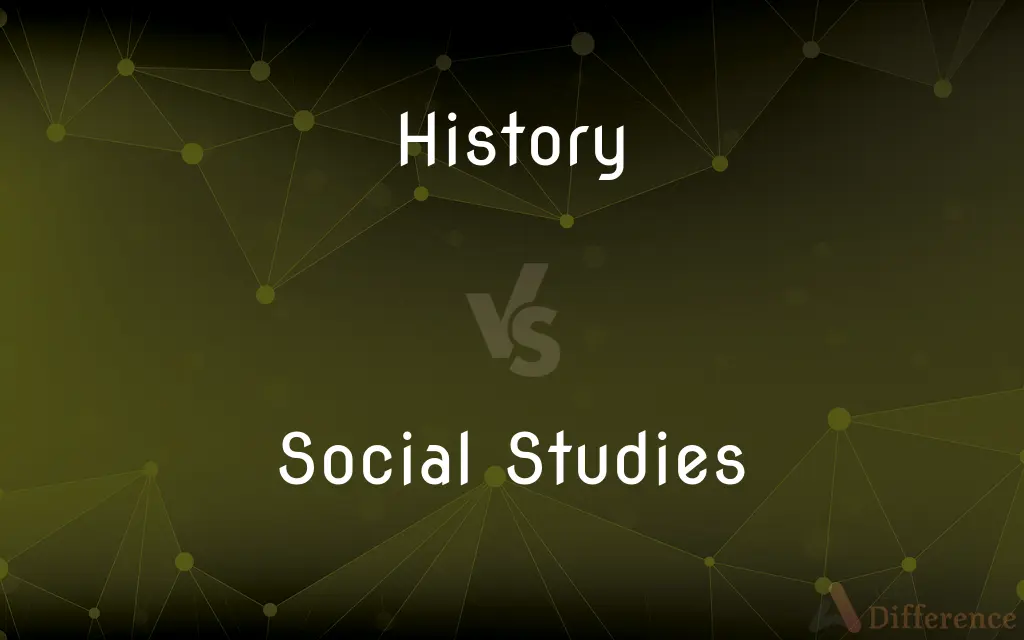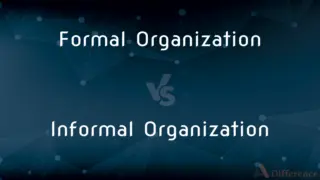History vs. Social Studies — What's the Difference?
By Tayyaba Rehman — Published on December 29, 2023
History is the study of past events, while Social Studies encompasses various disciplines examining human society and relationships.

Difference Between History and Social Studies
Table of Contents
ADVERTISEMENT
Key Differences
History is the systematic record and interpretation of past events, especially as relating to human societies and civilizations. On the other hand, Social Studies is a broader field that encompasses multiple disciplines, which includes History, but also branches into areas like sociology, geography, political science, and anthropology.
History focuses on understanding the chronology of events, the causes and consequences of those events, and drawing insights from them. Social Studies, however, delves into understanding human society in all its facets, exploring cultural, political, and spatial relationships and changes.
A person studying History might concentrate on specific time periods, wars, revolutions, or dynasties. A student of Social Studies, while they might study historical events, would also explore contemporary societal issues, governance, and human interactions.
When students learn History, they're introduced to primary and secondary sources, deciphering the authenticity and reliability of those sources, and understanding the narratives and counter-narratives of events. In Social Studies, while historical analysis is important, students also learn about social dynamics, cultural practices, political systems, and geographical contexts.
In essence, while History hones in on the past to understand our present, Social Studies uses multiple lenses, including history, to understand how societies function and how they've evolved over time.
ADVERTISEMENT
Comparison Chart
Nature of Study
Focuses on past events.
Studies human society, relationships, and various facets.
Scope
Limited to events of the past.
Broader, includes history, geography, civics, etc.
Main Objective
Understand chronological events and their impacts.
Understand societal functions, relationships, and change.
Sources Used
Primary and secondary historical sources.
Various sources, including historical, geographic, etc.
Method of Interpretation
Based on chronological narratives.
Interdisciplinary perspective.
Compare with Definitions
History
A chronological record of significant occurrences.
The History of Rome is vast and intricate.
Social Studies
An interdisciplinary study of history, civics, geography, and more.
Social Studies often bridges geography and history together.
History
Past experiences or background of a person or thing.
The car has a History of mechanical problems.
Social Studies
A school subject encompassing various disciplines.
In Social Studies, we learned about global economies.
History
A chronological record of events, as of the life or development of a people or institution, often including an explanation of or commentary on those events
A history of the Vikings.
Social Studies
Understanding of how societies are structured and function.
Through Social Studies, students learn about governance and democracy.
History
A formal written account of related natural phenomena
A history of volcanoes.
Social Studies
Exploration of societal behaviors and norms.
Social Studies helps us understand societal dynamics.
History
A record of a patient's general medical background
Took the patient's history.
Social Studies
The study of human society and social relationships.
Social Studies class taught us about different cultures.
History
An established condition or pattern of behavior
An inmate with a history of mental illness and drug abuse.
History
The branch of knowledge that records and analyzes past events
"History has a long-range perspective" (Elizabeth Gurley Flynn).
History
The past events relating to a particular thing
The history of their rivalry is full of intrigue.
History
The aggregate of past events or human affairs
Basic tools used throughout history.
History
An interesting past
A house with history.
History
Something that belongs to the past
Their troubles are history now.
History
(Slang) One that is no longer worth consideration
Why should we worry about him? He's history!.
History
A drama based on historical events
The histories of Shakespeare.
History
The aggregate of past events.
History repeats itself if we don’t learn from its mistakes.
History
The branch of knowledge that studies the past; the assessment of notable events.
He teaches history at the university.
History will not look kindly on these tyrants.
He dreams of an invention that will make history.
History
The portion of the past that is known and recorded by this field of study, as opposed to all earlier and unknown times that preceded it (prehistory).
In all of human history and prehistory
In all recorded history
History
(countable) A set of events involving an entity.
What is your medical history?
The family's history includes events best forgotten.
A long and sordid history
History
(countable) A record or narrative description of past events.
I really enjoyed Shakespeare's tragedies more than his histories.
A short history of post-Columbian colonization
History
A list of past and continuing medical conditions of an individual or family.
A personal medical history is required for the insurance policy.
He has a history of cancer in his family.
This diagnosis is usually based solely on the history and physical examination, although laboratory tests are occasionally also obtained.
History
A record of previous user events, especially of visited web pages in a browser.
I visited a great site yesterday but forgot the URL. Luckily, I didn't clear my history.
History
(informal) Something that no longer exists or is no longer relevant.
I told him that if he doesn't get his act together, he's history.
History
(uncountable) Shared experience or interaction.
There is too much history between them for them to split up now.
He has had a lot of history with the police.
History
(obsolete) To narrate or record.
History
A learning or knowing by inquiry; the knowledge of facts and events, so obtained; hence, a formal statement of such information; a narrative; a description; a written record; as, the history of a patient's case; the history of a legislative bill.
History
A systematic, written account of events, particularly of those affecting a nation, institution, science, or art, and usually connected with a philosophical explanation of their causes; a true story, as distinguished from a romance; - distinguished also from annals, which relate simply the facts and events of each year, in strict chronological order; from biography, which is the record of an individual's life; and from memoir, which is history composed from personal experience, observation, and memory.
Histories are as perfect as the historian is wise, and is gifted with an eye and a soul.
For aught that I could ever read,Could ever hear by tale or history.
What histories of toil could I declare!
Justly Cæsar scorns the poet's lays;It is to history he trusts for praise.
No more yet of this;For 't is a chronicle of day by day,Not a relation for a breakfast.
Many glorious examples in the annals of our religion.
History
To narrate or record.
History
The aggregate of past events;
A critical time in the school's history
History
The continuum of events occurring in succession leading from the past to the present and even into the future;
All of human history
History
A record or narrative description of past events;
A history of France
He gave an inaccurate account of the plot to kill the president
The story of exposure to lead
History
The discipline that records and interprets past events involving human beings;
He teaches Medieval history
History takes the long view
History
All that is remembered of the past as preserved in writing; a body of knowledge;
The dawn of recorded history
From the beginning of history
History
The study of past events.
She loves reading books about world History.
History
A particular period or event in the past.
The History of the Renaissance fascinates many.
History
A story or tale of past events.
He recounted the History of his ancestors.
Common Curiosities
Is History a part of Social Studies?
Yes, History is one of the disciplines encompassed within Social Studies.
What does History focus on?
History focuses on studying and interpreting past events.
Why do we study History?
We study History to understand our past, learn from it, and gain insights into the present.
What subjects are included in Social Studies?
Social Studies includes history, geography, civics, sociology, economics, and more.
How does History impact our understanding of society?
History provides context and a foundation for understanding societal evolution and change.
Why is Social Studies important in schools?
Social Studies equips students with knowledge about societal functions, cultural practices, governance, and more, fostering informed and active citizenship.
What is the primary objective of Social Studies?
Social Studies aims to understand human society, relationships, and its various facets.
How does the study method differ between History and Social Studies?
History emphasizes chronological narratives, while Social Studies uses an interdisciplinary perspective.
Are the sources used in History and Social Studies different?
Yes, while History primarily uses historical sources, Social Studies employs a variety of sources, including geographic, economic, and sociological.
How is History relevant to modern times?
History offers lessons from the past, helping societies make informed decisions for the future.
Is History only about dates and events?
No, History is also about understanding contexts, causes, consequences, and deriving insights from past events.
Does Social Studies deal only with current societal issues?
No, while it addresses current issues, Social Studies also delves into historical and geographical contexts.
How do History and Social Studies interrelate in academic curriculum?
While History provides depth on past events, Social Studies offers breadth, covering history along with other societal disciplines.
Are Social Studies and Sociology the same?
No, while Sociology is a study of societal behaviors and structures, Social Studies is broader and includes multiple disciplines.
Can one be a historian without studying Social Studies?
Yes, one can specialize in History without extensively studying all disciplines in Social Studies.
Share Your Discovery

Previous Comparison
Formal Organization vs. Informal Organization
Next Comparison
Ice Cream vs. KulfiAuthor Spotlight
Written by
Tayyaba RehmanTayyaba Rehman is a distinguished writer, currently serving as a primary contributor to askdifference.com. As a researcher in semantics and etymology, Tayyaba's passion for the complexity of languages and their distinctions has found a perfect home on the platform. Tayyaba delves into the intricacies of language, distinguishing between commonly confused words and phrases, thereby providing clarity for readers worldwide.














































